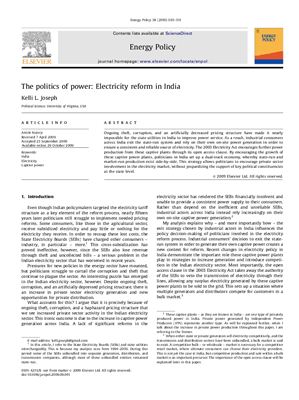На английском языке. Статья опубликована в ж. Energy Policy, 2010,
V. 38, P. 503-511.
Ongoing theft, corruption, and an artificially decreased pricing structure have made it nearly impossible for the state utilities in India to improve power service. As a result, industrial consumers across India exit the state-run system and rely on their own on-site power generation in order to ensure a consistent and reliable source of electricity. The 2003 Electricity Act encourages further power production from these captive plants through its open access clause. By encouraging the growth of these captive power plants, politicians in India set up a dual-track economy, whereby state-run and market-run production exist side-by-side. This strategy allows politicians to encourage private sector involvement in the electricity market, without jeopardizing the support of key political constituencies at the state level.
Ongoing theft, corruption, and an artificially decreased pricing structure have made it nearly impossible for the state utilities in India to improve power service. As a result, industrial consumers across India exit the state-run system and rely on their own on-site power generation in order to ensure a consistent and reliable source of electricity. The 2003 Electricity Act encourages further power production from these captive plants through its open access clause. By encouraging the growth of these captive power plants, politicians in India set up a dual-track economy, whereby state-run and market-run production exist side-by-side. This strategy allows politicians to encourage private sector involvement in the electricity market, without jeopardizing the support of key political constituencies at the state level.

